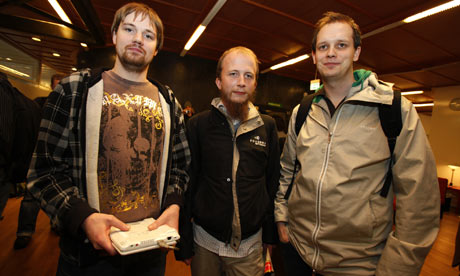Internet
I recently watched Simon Klose’s “TPB AFK: The Pirate Bay Away From Keyboard” at Hot Docs, the Canadian International Documentary Festival. Yeah, I paid to watch a film about the Pirate Bay, which you can watch for free on YouTube or of course, on TPB. The documentary film follows the three Swedish founders of the popular BitTorrent site Fredrik Neij, Gottfrid Svartholm, and Peter Sunde (as pictured below) from 2008 to 2012 as they are tried and attempt to re-appeal charges for copyright infrignement by various film and music studios supported by the International Federation of the Phonographic Industry.

Composed of conversations with the headstrong founders, the film is focused more on telling personal stories than it is outlining some sort of pirate manifesto. There are three main characters: Fredrik the hacker, Gottfrid the IT enthusiast, and Peter the idealist. In the beginning of the film, we watch them give snide remarks and oversimplified explanations of TPB to the members of the court who are old-fashioned. The hilarity subsides (just a bit) once the court decides to imprison the founders and demand monetary compensation. Afterwards, they attempt to out-run the authorities by leaving Sweden.
I highly reccomend this film; you will definitely learn more about the people behind the Pirate Bay and see the opposing views in the copyright infringement debate in action. The film might not be as easy to follow as other traditional documentaries because there is no narration and soundtrack. You’ll be reading subtitles if you don’t understand Swedish! Also, it’s interesting to see the generation gap in the use and support of file-sharing. Most youth today are not hesistant to download films, software, and books online; and most of us do so without ever really thinking about the reprucussions. For me, TPB AFK got me to reflect on why I am perfectly content with online piracy.

I don’t believe the Internet should be entirely controlled by the government. Although regulations like SOPA are meant to “protect” the integrity and entrepreneurship of intellectual property, I don’t think doing do so through basically what is censorship is the way to go. Our generation has grown up with the belief that the Internet is a place where anything can be shared and the user has choices. Why are we not creating solutions that fall from this? According to Peter Sunde, this is where Flattr comes in. It’s basically a tip jar users can add to in order to show support for certain content. With its user interface similar to a Facebook Like Button, Flattr could be a viable solution to supporting intellectural property in a way that is familiar to us (through the social networking effect). Perhaps these kinds of solutions will take away all the negativity that is associated with online piracy and allow supporters and non-supporters to reach a compromise.
Just an addenda: the legal threats against TPB is a funny read.
Related Posts:
Handling the haters
Liebster Award Q&A
Unplugging